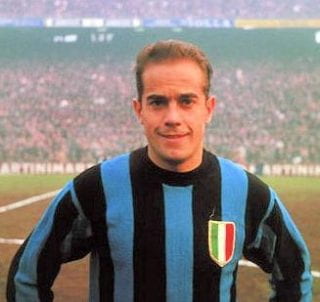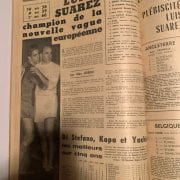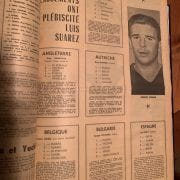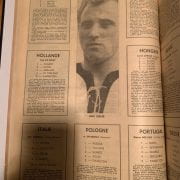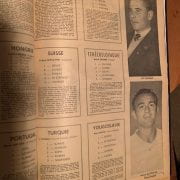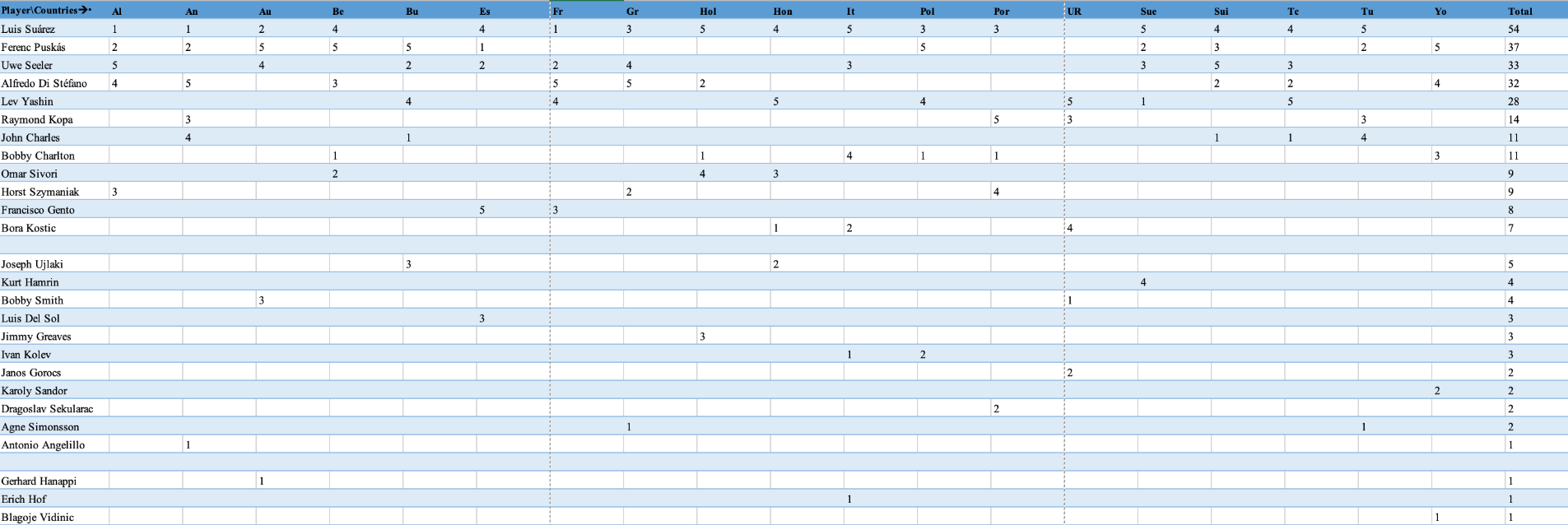Dr. José Luis Pierrend from Rec.Sport.Soccer Statistics Foundation recently shared his feeling that the biggest mistake ever made in Golden Ball history is that Ferenc Puskas did not win the trophy in 1960.
This article aims to reflect on such a miss, which can be considered a bad joke since Puskas was born on April 1 (in 1927) but above all as a terrible injustice. I certainly do not claim to know all the ins and outs of this decision but rather would like to discuss some possibilities. For that, it is first necessary to delve, even briefly, into Puskas’ career up to 1960.
Flashback:
Simple reference to Puskas’ name evokes memories of the great 1950’s Hungarian team: the Mighty Magyars, also nicknamed the Golden team. They were Olympic champions in 1952, beat England 6-3 at Wembley in November 1963 in the game called “the match of the century” before winning again against this English team but in Budapest in May 1954 with the staggering score of 7-1. The Golden team was undefeated between April 10, 1949 (5-2 loss against Czechoslovakia) and February 19, 1956 (3-1 defeat against Turkey), with the terrible exception of the 1954 World Cup final against West Germany lost by 3-2 – even though Hungary was leading 2-0 after only 8 minutes. It is important to remember that Puskas declared after this final that the Germans were doped, which may indeed be the case, with the same drug, Pervitin, that Nazi soldiers used during World War II.
Puskas’ love affair with the Hungarian national team ended on October 14, 1956 with a victory at the Prater Stadion in Vienna against Austria by a score of 2-0, a match in which he scored his 84th goal in 85 caps (his teammate and top scorer of the 1954 World Cup, Sandor Kocsis, scored his 75th and last goal in 68 selections in Colombes against France a week earlier during the Hungarian victory 2-1). This story came to an end because of the 1956 Revolution that broke out in Hungary on October 23, 1956, with students demonstrating against Soviet control of Hungarian politics. Soviet tanks entered Budapest on November 4, 1956, and the Hungarian revolt was put down in a bloodbath. At the same time, the Budapest Honvéd team played in the European Cup against Athletic Bilbao in San Mamès. Several players, including Puskas, refused to return to Hungary. UEFA then suspended Ferenc Puskas for two years. Real Madrid then recruited him in 1958 after this suspension, at the advanced age of 31; this, despite the 40 pounds gained during his period of inactivity.
Let’s now look at Ferenc Puskas’ 1959-60 season with Real. This borders on the irrational on the part of a player who celebrated his 33rd birthday on April 1, 1960. He won the title of top scorer in La Liga (Pichichi) with 25 goals and unleashed himself in the European Champion Clubs’ Cup: a hat-trick for Madrid against Luxembourg club of Jeunesse Esch for a 7–0 victory in the first leg of the first round, accompanied by another goal in the second leg for a 5–2 victory for Real; a tally at Santiago Bernabeu in the 4–0 win over Nice in the quarter-final second leg; another goal in Madrid for a 3-1 victory against the arch rival Barça for the semi-final first leg, followed by two tallies at the Camp Nou for another victory for Real by 3-1. The final game for this European Cup was played in Glasgow against Eintracht Frankfurt. To be able to play it, Puskas was forced to apologize in writing to the German Football Federation (the DFB) for his comments on the doping of West Germany during the final of the 1954 World Cup. Indeed, the DFB banned all its clubs from playing against a team Puskas was on, in retaliation for his previous words about doping. As revenge, Puskas achieved the only quadruple in a European Champion Clubs’ Cup final during this match on May 18, 1960, with a 7-3 victory for Real (with Di Stefano scoring a hat-trick for the club from the Spanish capital). Puskas therefore finished the top scorer in this European Champion Clubs’ Cup with 12 goals.
It was then time to play the Intercontinental Cup against Penarol. The first leg in Uruguay in July 1960 ended in a 0-0 draw, but the return in September 1960 was a Spanish demonstration with a 5-1 victory. Puskas stood out again by scoring two goals in the first eight minutes of the match. The 1960-61 season also saw Puskas finishing Pichichi once again with 28 goals, demonstrating that he finished on a high note the 1960 year.
Soccer fans were thus witnessing a wonderful story with Puskas in 1960: one of the best players in the world, perhaps unfairly deprived of a World Cup victory with one of the greatest national teams, returned to an exceptional level after a two-year suspension and at the canonical age of 33. The resurrection has taken place, the Phoenix was reborn from its ashes, the fountain of youth was a reality and not a myth. It was therefore obvious that Ferenc Puskas was going to win his first Golden Ball in 1960 and the question was rather who will be second and with how many points’ differences.
The 1960 Golden Ball vote:
This vote took place on December 13, 1960, and it was a dismay for football lovers and connoisseurs. Not only was Puskas second behind Spaniard Luis Suarez but the gap was astonishing. It was of 17 points since the Barcelona player received 54 points while Ferenc only gleaned 37. There was 46% difference between these two players in favor of the Spaniard, while Luis Suarez could only argue to have won La Liga during the 1959-60 season and to have been part of the Barcelona group that won the less glorious Inter-Cities Fairs Cup for his prize list. Fairs should have been changed to Unfair to characterize this 1960 Golden Ball vote. It was also surprising to realize that Puskas was only four points ahead of the third place, the German Uwe Seeler.
What happened? To answer this question, let us first display the results of each of the 19 voters (these results and photos were scanned and then transmitted by Doctor José Luis Pierrend, to whom I express my gratitude).
Let’s now organize these results in the following table:
Al: Allemagne [Germany]; An: Angleterre [England]; Au : Autriche [Austria]; Be: Belgique [Belgium]; Bu: Bulgarie [Bulgaria]; Es: Espagne [Spain]; Gr: Grèce [Greece]; Hol: Hollande [The Netherlands]; Hon: Hongrie [Hungary]; It: Italie [Italy]; Pol: Pologne [Poland]; Por: Portugal [Portugal]; Ur: URSS [Soviet Union]; Sue: Suède [Sweden]; Sui: Suisse [Switzerland]; Tc: Tchécoslovaquie [Czechoslovakia]; Tu: Turquie [Turkey]; Yo: Yougoslavie Yugoslavia]
The first row corresponds to the voter’s country identified with the first two or three letters of the country name (the correspondence between these letters and the full name of the country in French and then English is given below the table). The following rows indicate the results of these voters (in number of points) for each named player as well as the total (“Total”) of points that this player received. A first place is worth 5 points, a second gives 4 points, a third yields 3 points, a fourth provides 2 points and a fifth place equals 1 point. An empty box indicates that the player in this row was not chosen among the first 5 by the jury associated with the column. For example, the player from the last row, Vidinic, was only nominated by the Yugoslav jury (whose abbreviation is Yo) for his fifth place (which is worth one point).
This table allows us first to see that Puskas collected more first places than Suarez: five for the Hungarian, who was acclaimed by the jury from Austria, Belgium but also Bulgaria, Poland and Yugoslavia, which are three countries that at one time belonged to the Eastern Bloc. This is to be compared to the first four places for Suarez who topped the votes for the Dutch, Italian, Swedish and Turkish journalists. Until now, everything was going well in the best of all possible worlds, as Pangloss said in Molière’s Candide. It was after that things got out of hand, with a shocking eight juries out of 19 not even putting Puskas in the top 5 of their rankings while Suarez appeared in all the voting lists, with the exception of Bulgaria, the USSR and Yugoslavia.
So, let us focus on these eight countries and look for possible reasons for the absence of Puskas in their choice. There’s Puskas’ own country, Hungary, as well as the cousin Czechoslovakia and big brother Soviet Union. These three countries were also the only ones to have chosen the Soviet Lev Yashin in first place in their ranking. It is therefore obvious that Puskas paid for his refusal to return to Hungary after the revolution of 1956, all orchestrated by Moscow. However, even if these three countries had placed Puskas at the top of their rankings, which would have given him 15 additional points while taking two away from Suarez (since he would have lost a place in the Hungarian and Czechoslovak rankings), the Golden Ball would not still have gone to Puskas because he would then have had the same number of points as Suarez. We must therefore also look at the five other countries which have not put Puskas in their list. Of those five, there are four, Greece, The Netherlands, Italy and Portugal, that have Suarez in at least third place. So why did they choose Suarez and not Puskas in the first five? Did some juries have communist sympathies? Did the Italian jury, which did not even include a single Real player in its list, not recover from the defeat of AC Milan against Real in the final of the 1957-58 European Cup? Maybe some simply wanted fresh air in European football after Real won five European Champion Clubs’ Cup in a row between 1956 and 1960 and perhaps wanted to reward Real’s first elimination in that European Cup by the Barca of Suarez just a month before the results of the 1960 Golden Ball votes? This last possibility needs to be strongly considered because Suarez had scored both Barca goals in Madrid during the first leg of the second round, which ended with a score of 2 to 2 and which was played on November 9, 1960. The title from the France Football magazine “Luis Suarez, champion of the new European wave” seems to confirm this possibility.
However, for me, the huge surprise of the 1960 Golden Ball vote comes from the French jury – the last holdout not to have named Puskas in his list of 5 players. This jury is the legendary journalist Gabriel Hanot who not only created the Golden Ball but also the European Cup. This latest creation took place in reaction to the Wolverhampton-Honved match of December 13, 1954 (won 3-2 by the English), to propose a competition which would establish the identity of the best European club of the season. And who played for Honved in that historic 1954 match? Ferenc Puskas, of course. We can therefore postulate that the European Cup has Gabriel Hanot as its founding father and Puskas as one of its darling sons (especially after 4 goals in the final of European Champion Clubs’ Cup) and imagine the following reaction from Puskas when he saw the choice of the French journalist: “Et tu, Gabriel”? How could Hanot not include the Hungarian genius in his list? One possibility dates back to the 1958 Golden Ball vote, for which there was a (probably unwritten) rule that prevented the previous winner, in this case Di Stefano, from winning this trophy. Raymond Kopa then won it and indicated years later that Di Stefano had envied him for it. To avoid such wrath from the nicknamed Blonde Arrow again, didn’t Hanot put Di Stefano in first place? In addition, one of the Golden Ball criteria has often been the track record obtained with the national team and/or club. And who better than Yashin winner of Euro 1960 and Gento winner of the first 5 European Champion Clubs’ Cup with Real to satisfy this criterion, which would explain the choice of Hanot for his second and third places? Once two Real players are chosen from the list, it becomes difficult to incorporate a third, especially when you are the founder of the European Cup which brings together so many different countries and clubs. Which may explain why Puskas was not chosen by Hanot.
We can also notice that several countries placed Puskas in their top five but in fourth or fifth place, unworthy of his talent and extraordinary year. For example, Germany only gave two points while allowing three to its local player, Horst Szymaniak. Did Germany want to make Puskas regret his previous comments on doping while giving him a few points for making the impression that they were being merciful? Or did it simply give voice to chauvinism, as inline with Uwe Seeler being at the top of its ranking? This chauvinism seemed to be well embedded in the mentality of voters, given that Austria was the only one to have placed Hanappi on its list, as well as Sweden with Kurt Hamrin and Yugoslavia with Blagoje Vidinic.
But what about Spain then under the tutelage of Franco? Three Spanish-born Spaniards in the first three places: first, Gento as a good example of the Caudillo’s favorite club, followed by a Barcelona player (Suarez) and Luis Del Sol who joined Real in April 1960. Puskas was only in a pitiful fifth place and Alfredo Di Stefano was not even in the list. When we realize that the Spanish jury was not only the only one to have put Gento at the top of the list but also to have nominated Del Sol, we can legitimately think that the nationalism of the Spanish regime of the time was manifested in the choice of the 1960 Golden Ball.
So, let’s imagine a world in 1960 where geo-politics had no place, where chauvinism could have been expressed but only for the first place and where Puskas’ talent and amazing year would have been recognized for the Golden Ball. We could then have been entitled to Puskas ranked (1) first by the Hungarians and Czechoslovaks; (2) second behind Yashin for the Soviet jury and (2) second also but behind Gento for the Spanish voter. And there, the winner of the 1960 Golden Ball would have been Puskas. It is ironic that one of the possible reasons for Puskas not being awarded this Golden Ball could therefore be found in the joint decision of communist countries and Franco’s Spain not to place Puskas in their list or at the top of this list, while these countries hated each other so much that dictator Franco ordered the Spanish team not to play their Euro 1960 quarter-final against the USSR.
This snub was very unfortunate for Pukas, especially after already experiencing such great disillusionment with the defeat of the Golden team in the final of the 1954 World Cup. I wonder if Puskas recovered from the disappointment of not winning the 1960 Golden Ball. A possible answer was given a month after this vote with a Real Madrid-Elche played on January 22, 1961. Victory for Real 8-0. Five goals from Ferenc Puskas, the real winner of the 1960 Golden Ball for all football fans and connoisseurs.
The first version of this article was published in pinte de foot 2022.
Laurent Bellaiche is a Distinguished Professor in the Physics Department and Institute for Nanoscience and Engineering, as well as the Twenty-First Century Endowed Professor in Optics, Nanoscience and Science Education (for more details, please see: ccmp.uark.edu). His favorite team is Paris Saint-Germain, especially that of the first trophies (French Cups) in the 1980’s, with the three Dominique’s (Baratelli, Bathenay and Rocheteau) and two jewels (Safet Susic and Mustapha Dahleb). His two favorite male football players of all time are Diego Armando Maradona and Robby Rensenbrink. His current three favorite female players are Grace Geyoro, Melchie Dumornay and, of course, Sophia Smith. His favorite soccer/football quote is one from Bill Shankly, “Some people think football is a matter of life and death – I assure you, it’s much more important than that.”


